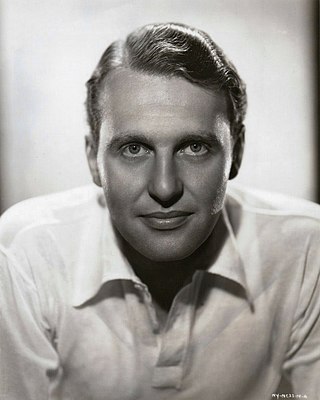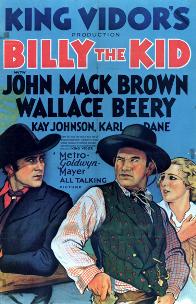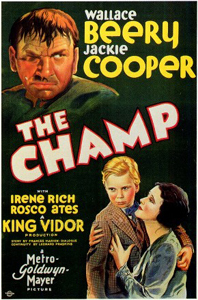
The Big House is a 1930 American pre-Code prison drama film directed by George Hill, released by Metro-Goldwyn-Mayer, and starring Chester Morris, Wallace Beery, Lewis Stone and Robert Montgomery. The story and dialogue were written by Frances Marion, who won the Academy Award for Best Writing Achievement. As one of the first prison movies, it inspired many others of this genre.

Wallace Fitzgerald Beery was an American film and stage actor. He is best known for his portrayal of Bill in Min and Bill (1930) opposite Marie Dressler, as General Director Preysing in Grand Hotel (1932), as Long John Silver in Treasure Island (1934), as Pancho Villa in Viva Villa! (1934), and his title role in The Champ (1931), for which he won the Academy Award for Best Actor. Beery appeared in some 250 films during a 36-year career. His contract with Metro-Goldwyn-Mayer stipulated in 1932 that he would be paid $1 more than any other contract player at the studio. This made Beery the highest-paid film actor in the world during the early 1930s. He was the brother of actor Noah Beery and uncle of actor Noah Beery Jr.

John Cooper Jr. was an American actor and director. Known as Jackie Cooper, he began his career performing in film as a child, and successfully transitioned to adult roles and directing in both film and television. At age nine, he became the only child and youngest person nominated for the Academy Award for Best Actor, for the 1931 film Skippy. He was a featured member of the Our Gang ensemble in 1929–1931, starred in the television series The People's Choice (1955–1958) and Hennesey (1959–1962), and played journalist Perry White in the 1978–1987 Superman films.

Dr. Jekyll and Mr. Hyde is a 1931 American pre-Code horror film, directed by Rouben Mamoulian and starring Fredric March, who plays a possessed doctor who tests his new formula that can unleash people's inner demons. The film is an adaptation of The Strange Case of Dr. Jekyll and Mr. Hyde, the 1886 Robert Louis Stevenson tale of a man who takes a potion which turns him from a mild-mannered man of science into a homicidal maniac.
The following is an overview of 1931 in film, including significant events, a list of films released and notable births and deaths.

Min and Bill is a 1930 American pre-Code comedy-drama film, directed by George W. Hill and starring Marie Dressler and Wallace Beery. Adapted by Frances Marion and Marion Jackson from Lorna Moon's 1929 novel Dark Star, the film tells the story of dockside innkeeper Min's tribulations as she tries to protect the innocence of her adopted daughter, Nancy, while loving and fighting with boozy fisherman Bill, who resides at the inn. The picture was a runaway hit. In 1931, the studio released a Spanish-language version of Min and Bill, La fruta amarga, directed by Arthur Gregor and starring Virginia Fábregas and Juan de Landa.

Ralph Rexford Bellamy was an American actor whose career spanned 65 years on stage, film, and television. During his career, he played leading roles as well as supporting roles, garnering acclaim and awards, including a Tony Award for Best Actor in a Play for Sunrise at Campobello as well as Academy Award for Best Supporting Actor nomination for The Awful Truth (1937).

Robert Dean Stockwell was an American actor with a career spanning seven decades. As a child actor under contract to Metro-Goldwyn-Mayer, he appeared in Anchors Aweigh (1945), Song of the Thin Man (1947), The Green Years (1946), Gentleman's Agreement (1947), The Boy with Green Hair (1948), and Kim (1950). As a young adult, he had a lead role in the 1957 Broadway and 1959 screen adaptation of Compulsion; and in 1962 he played Edmund Tyrone in the film version of Long Day's Journey into Night, for which he won two Best Actor Awards at the Cannes Film Festival. He was nominated for a Golden Globe Award for Best Actor – Motion Picture Drama for his starring role in the 1960 film version of D. H. Lawrence's Sons and Lovers.

Ben-Hur is a 1959 American religious epic film directed by William Wyler, produced by Sam Zimbalist, and starring Charlton Heston as the title character. A remake of the 1925 silent film with a similar title, it was adapted from Lew Wallace's 1880 novel Ben-Hur: A Tale of the Christ. The screenplay is credited to Karl Tunberg, but includes contributions from Maxwell Anderson, S. N. Behrman, Gore Vidal, and Christopher Fry. The cast also features Stephen Boyd, Jack Hawkins, Haya Harareet, Hugh Griffith, Martha Scott, Cathy O'Donnell and Sam Jaffe.

Noah Nicholas Beery was an American actor who appeared in films from 1913 until his death in 1946. He was the older brother of Academy Award-winning actor Wallace Beery as well as the father of prominent character actor Noah Beery Jr. He was billed as either Noah Beery or Noah Beery Sr. depending upon the film.

Noah Lindsey Beery was an American actor often specializing in warm, friendly character roles similar to many portrayed by his Oscar-winning uncle, Wallace Beery. Unlike his more famous uncle, however, Beery Jr. seldom broke away from playing supporting roles. Active as an actor in films or television for well over half a century, he was best known for playing James Garner's character's father, Joseph "Rocky" Rockford, in the NBC television series The Rockford Files (1974–1980). His father, Noah Nicholas Beery enjoyed a similarly lengthy film career as an extremely prominent supporting actor in major films, although the elder Beery was also frequently a leading man during the silent film era.

The Bowery is a 1933 American pre-Code historical comedy-drama film set in the Lower East Side of Manhattan around the start of the 20th century directed by Raoul Walsh and starring Wallace Beery and George Raft. The supporting cast features Jackie Cooper, Fay Wray, and Pert Kelton.
The 4th Academy Awards were held on November 10, 1931 by the Academy of Motion Picture Arts and Sciences, awarding films released between August 1, 1930, and July 31, 1931. Cimarron was the first Western to win Best Picture, and would remain the only to do so until Dances with Wolves won in 1990. Cimarron received a then-record seven nominations, and was the first film to win more than two awards; it and A Free Soul were the first films to receive multiple acting nominations.

The 5th Academy Awards were held by the Academy of Motion Picture Arts and Sciences on November 18, 1932, at the Ambassador Hotel in Los Angeles, California, hosted by Conrad Nagel. Films screened in Los Angeles between August 1, 1931, and July 31, 1932, were eligible to receive awards. Walt Disney created a short animated film for the banquet, Parade of the Award Nominees.

Billy the Kid is a 1930 American pre-Code Western film directed in widescreen by King Vidor about the relationship between frontier outlaw Billy the Kid and lawman Pat Garrett. In February 2020, the film was shown at the 70th Berlin International Film Festival, as part of a retrospective dedicated to King Vidor's career.

Treasure Island is a 1934 film directed by Victor Fleming and starring Wallace Beery, Jackie Cooper, Lionel Barrymore, Lewis Stone, and Nigel Bruce. It is an adaptation of Robert Louis Stevenson's famous 1883 novel of the same name. Jim Hawkins discovers a treasure map and travels on a sailing ship to a remote island, but pirates led by Long John Silver threaten to take away the honest seafarers’ riches and lives.

Old Ironsides is a 1926 American silent historical war film directed by James Cruze and starring Charles Farrell, Esther Ralston, Wallace Beery, and George Bancroft. It was produced and distributed by Paramount Pictures.

The Mighty McGurk is a 1947 American sports drama film directed by John Waters and starring Wallace Beery, Dean Stockwell and Edward Arnold. Beery appears as a boozing ex-boxer brawling as a bouncer in a Bowery saloon.

Chinatown Nights, also known as Tong War, is a 1929 film starring Wallace Beery and begun as a silent film then finished as an all-talking sound one via dubbing. Directed by William A. Wellman and released by Paramount Pictures, Chinatown Nights also stars Florence Vidor, former wife of director King Vidor, who did not dub her own voice and quit the movie business immediately afterward, preferring not to work in sound films; her voice in Chinatown Nights was supplied by actress Nella Walker. The supporting cast includes Warner Oland as a Chinese gangster and Jack Oakie as a stuttering reporter. The movie was based upon the story "Tong War" by Samuel Ornitz.

The Champ is a 1979 American neo noir drama sports film directed by Franco Zeffirelli and a remake of the 1931 Academy Award-winning film of the same name directed by King Vidor. It stars Jon Voight as Billy Flynn, a former boxer who attempts to support his son and reconcile with his ex-wife by fighting in the ring again.



















